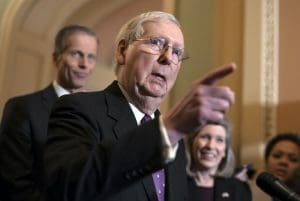GOP senators try to run from FBI funding they put in new relief bill to appease Trump
Several Republicans have publicly balked at spending provisions in their own bill.

A day after Republicans released their long-awaited coronavirus relief bill, GOP senators are already complaining about unrelated funding measures in it, including $1.75 billion demanded by the White House to build a new FBI headquarters in Washington, D.C.
“That makes no sense to me,” Sen. Lindsey Graham (R-SC) said on Tuesday. He added he would be “fine” if the FBI funds were taken out.
Senate Majority Leader Mitch McConnell appeared confused about the funding when asked about it by reporters on Monday.
“I’m not sure that it is [included],” he said during a press conference about the legislation. McConnell later deflected responsibility for the language in his own bill, saying that the Trump administration had insisted on the provision, and “they will have to answer the question as to why they insisted on that.”
The content of the bill was negotiated by Senate Republicans and the White House, without input from Democratic members. According to the Washington Post, Republican lawmakers initially resisted the White House’s repeated demands the FBI funds be included, but eventually relented, including the provision in the final legislation.
According to the Post, Democrats have claimed Trump is acting in his own self-interest by pushing for the provision, allegedly preventing a competing hotel from potentially being built where the current FBI headquarters are located — just down the road from the Trump International Hotel.
The White House has denied Trump is functioning with his own business interests in mind. “As President Trump has said, the FBI desperately needs a new building and this measure provides critical funding for this project that would keep the building responsibly near the Department of Justice,” Judd Deere, a White House spokesperson, told the Post on Monday.
Despite his apparent agreement with the White House, McConnell told reporters on Tuesday that he opposed the funding.
“I am opposed to non-germane amendments whether it’s funding for the FBI building … When we get to the end of the process I would hope all of the non-COVID-related measures are out,” McConnell said.
In addition to funding for the FBI building, the GOP legislation — known as the HEALS Act — would provide $30 billion in additional military spending. And while the previous coronavirus relief package provided an additional $600 per week in unemployment benefits for those who have lost their jobs as a result of the virus, the Republican proposal cuts that amount to $200 per week.
The bill is meant to be “just the first step toward negotiations with the Democrats,” one Republican congressional aide wrote in an email on Tuesday.
But the seemingly unrelated funding in the bill has rankled Republican senators before negotiations even start.
“There are a hundred problems with the plan,” Sen. Ben Sasse (R-NE) told a reporter on Tuesday when asked about the funding for the FBI headquarters.
Sen. John Barrasso of Wyoming told a reporter on Tuesday that money for the FBI building was “better handled through the regular appropriations process,” not in an emergency bill.
When a reporter asked Sen. Richard Shelby, chair of the Senate Appropriations Committee, how a new FBI headquarters was related to coronavirus relief, Shelby responded, “Good question,” adding that some parts of the bill “stretch the link” of being related to the current pandemic.
When the Democratic-led House passed a coronavirus relief package in May, Republicans attacked it for containing unrelated funding priorities.
The bill was “a liberal wish list,” McConnell said on May 16, adding it was “an unserious product from an unserious majority.”
Shortly before the House passed that bill, McConnell said that there was no sense of “urgency” to act quickly on additional coronavirus relief efforts. For the next two months, the Senate did not pass any additional relief bills.
Because of McConnell’s delay, the enhanced unemployment assistance from the previous relief package will expire at the end of July, leaving millions of Americans without the additional help in the middle of both a pandemic and a recession.
Published with permission of The American Independent Foundation.
Recommended

Biden campaign launches new ad focused on Affordable Care Act
Former President Trump has said he wants to do away with the popular health care law.
By Kim Lyons, Pennsylvania Capital-Star - May 08, 2024
Ohio doctors fear effects of emergency abortion care case set to go before U.S. Supreme Court
A federal law that allows emergency departments to treat patients without regard to their ability to pay will be under U.S. Supreme Court scrutiny this week, and Ohio doctors are concerned about the case’s local impact on emergency abortion care.
By Susan Tebben, Ohio Capital Journal - April 23, 2024
House GOP votes to end flu, whooping cough vaccine rules for foster and adoptive families
A bill to eliminate flu and whooping cough vaccine requirements for adoptive and foster families caring for babies and medically fragile kids is heading to the governor’s desk.
By Anita Wadhwani, Tennessee Lookout - March 26, 2024









































































